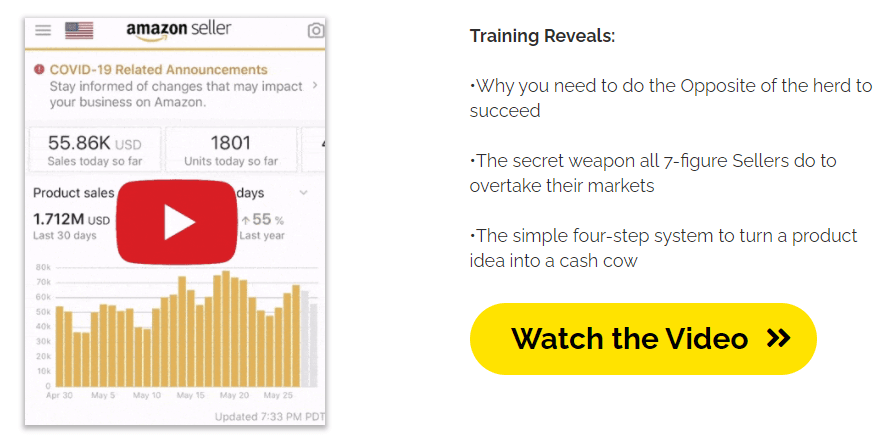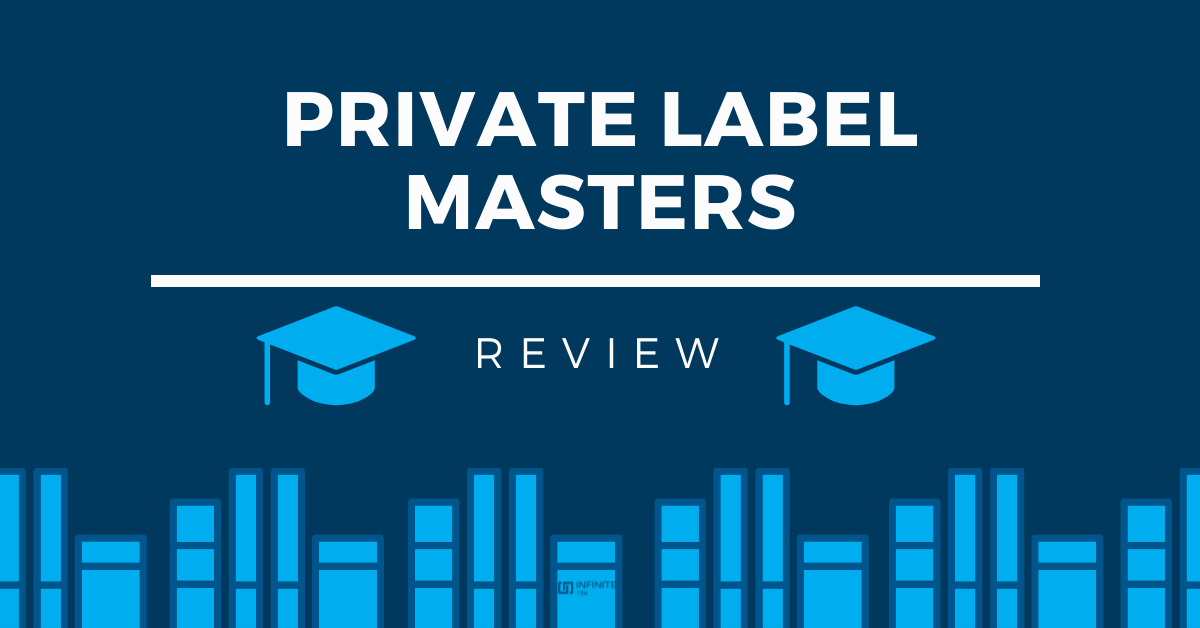Private Label Masters is the Amazon selling online course from guru Tim Sanders. It promises to take users through a business model he calls ‘compound layering’ and help them build their Amazon business with a practical style that he pioneered himself.
It’s always good to know that the key proponent of a sales technique uses their own course advice in their Amazon business, which is what got us interested in writing a Private Label Masters review. We suspect that some of these mercurial sales gurus promote solid-seeming techniques but don’t let on how much of their personal success was down to nebulous qualities like their charisma.
So Is the Tim Sanders technique transferable? Can any Amazon seller become a Private Label Master? Does his repeated claim that ‘this is not a get-rich-quick scheme’ stand up to scrutiny? In this Private Label Masters review, we take a deep dive into the Private Label Masters course to find out.
Who is Tim Sanders?

Tim Sanders is a highly successful Amazon FBA seller. He is the founder of Private Label Masters, a course that teaches the best practices for selling online as well as important information other courses might overlook. He also runs a popular YouTube channel.
His approach to business is that anyone can achieve success through understanding. His goal with Private Label Masters is to help rookie sellers on their exciting journey away from the drudgery of a day job and instead take charge of their own lives.
Private Label Masters Course Features
The course takes you through the process of starting up and maintaining a successful Amazon FBA business. Covering everything from the Amazon launch service to obtaining shipping labels, its design is:
- 132 lessons delivered in instructional videos
- Divided into 8 modules
- 20 hour run time
Some modules are longer than others, but this is largely in respect of how many Amazon businesses typically fail at a certain stage! For example, the longest module is on how to research a product, weighing in at 3 hours. Poor research is one of the most prominent reasons for an Amazon FBA business failing to make money online, so the heavy focus makes sense.
Without further ado, let’s unpack the Private Label Masters course and see what we can learn from Tim Sanders.

Module 1: Introduction
The Amazon course opens by letting you know who Tim Sanders is and why he wants to help you master selling on Amazon. It’s a short 2-minute video and is a nice touch before we move onto the main event.
Why Start an Amazon Business?
One of the first things covered in this business model is why so many of us start trying to earn money online. We become tired of our day jobs, not having any time to do what we want, and not being in charge of our own fates.
It’s also emphasized again that get-rich-quick simply isn’t the attitude you need to succeed here. Tim stresses that while it’s possible to see impressive gains in the short term, this shouldn’t be your goal. Your goal should be autonomy, which brings us to his 5 Components of Business.
5 Components of Business
Tim explains that there are 5 essentials that you need to understand if your business is to get off the ground. These are:
1) Mindset
Let’s get this clear straight away: Private Label Masters is big on mindset. Tim stresses the link between the reasons you want to move away from your day job to the reasons that will keep you engaged and drive your success as a seller.
There’s a nice exercise where he examines why being a successful Amazon FBA seller is something that he’d also consider success in his life. This is important and arguably something not enough of us take the time to do. It’s no good starting a business if you find a year later that you’re muddling through just as you were in your old job, with no clear idea of why you’re doing this.
2) Licensing
Moving away from the romantic side of things, Tim explains why he considers an LLC license the best license for this kind of business (as opposed to an S Corp or sole proprietor license). One slightly questionable piece of advice is that he recommends starting selling even if you don’t have a license. We’d tend to recommend against ‘sell first, ask questions later,’ but it’s a minor point.
3) Taxes
Private Label Masters advises against trying to do everything and manage your own tax. Rather, Tim explains how to find a good CPA and how this move will benefit you. It’s also explained how you can obtain an EIN.
4) Liability Insurance
This is an important point to cover for new sellers. Tim explains the difference between high liability and low liability products and why you should opt for the latter. This explainer is a good early sign that Private Label Masters has your interests at heart.
5) Amazon’s Fees
If you don’t know how Amazon fees work, you won’t get very far! This video covers the costs associated with selling on Amazon, which seems basic but we like the ‘assume nothing’ approach.
Features Absent from the Module
One criticism you could make of Private Label Masters is that this opening is a little too focused on how your approach to business will help you succeed, and not focused enough on what that looks like in hard numbers. Given that romance over facts is the death of the dream for many sellers with zero prior experience, it seems like an oversight.
However, there’s no question that mindset is vital for success. Plus the later stages of the Private Label Masters course get far more into the nitty-gritty of how Amazon selling works.
Module 2: Product Research
The importance of good research is something that Tim emphasizes over and over again. The message is that a successful Amazon seller has to do their research or risk repeatedly pouring money into the wrong products.
Home Runs
Tim claims that a frequent mistake is to go for a ‘home run’ product rather than an all-around team of steady sellers. A hundred sales per week each from 10 products is better than 500 sales per week from 1 product and only a few sales apiece from the other 9, is the message.
Bad Apples
This section explains how to identify hard-to-manage products that can derail your operation. These include:
- High-liability products
- Gated Amazon products
- Seasonal products
It’s an extension of the home run metaphor in many ways. The emphasis remains on sticking with solid, evergreen products rather than trying to catch lightning.
How to Perform Research
Tim shows how to use Chrome extensions to help you with product research. These extensions are a must for Amazon sellers, and we like that he provides a breakdown of which features are the most useful.
As we’ve mentioned, this section is long. It’s worth it, though. The videos show you just how laborious the product-finding process can be as you strive to find something that will help your business to grow. This covers everything from costing changes you can make to improve the product to discovering low-competition niches.
Discovering how a message center bulletin board could be a better sales option for you than something obvious like plant pots is an eye-opener. You don’t find the good stuff without looking for it.
Product Deep Dives
In these videos, Tim takes 3 sample products and explains how to use research tools to thoroughly understand the pros and cons of a product. His selections and the video lengths are:
- A 10-liter dry bag (15 minutes)
- A child’s teepee (19 minutes)
- A sensory blanket (18 minutes)
If spending the best part of an hour watching someone research these fascinating products isn’t for you, we understand. However, it’s also why we consider this segment one of the strongest parts of the Private Label Masters set-up: it’s relentless in its rigor to teach you that you have to put the same work in.
Building a Brand
Finally, we start talking about brand building and suddenly everyone’s listening! This section has a very neat approach covering the differing learning styles of people using the Tim Sanders course. It explains how different brand styles might suit the learning process of different sellers.
This is a nice touch, as it provides evidence that you don’t have to be Tim Sanders to benefit from the Tim Sanders methodology.
Module 3: Product Sourcing
This module is heavily focused on Alibaba.com, the Chinese online retail giant founded by the legendary Jack Ma.
Searching on Alibaba
Tim suggests that the first rule of Alibaba is that you don’t trust the price and minimum order quantity (MOQ) on Alibaba. This is because both of these quantities tend to be negotiated after an exchange begins and bidding prices may be very different from initial suggestions.
As many Western sellers won’t be too familiar with how Alibaba works, this is useful information. It pertains not just to how the site works but how commerce works with Chinese local businesses, as we’ll explore in a moment.
Communicating with Suppliers
Tim covers how to negotiate with suppliers on the site. Using the live chat feature, he starts dialogues with multiple suppliers at the same time. We like that he shows how successful dialogues don’t exist solely on the platform: he exchanges Skype numbers with several promising candidates. Furthermore, he suggests several platforms such as WeChat that are preferred by suppliers.
It’s also made clear that you should get used to the Chinese way of e-commerce, which is altogether more personal than its Western counterpart. Knowing the person you’re communicating with is important for trust, and trust brings rewards in terms of favorable MOQs and pricing.
Tim gives examples of how he’s built strong relationships with suppliers by politely learning about their lives and showing the kind of personal attention Gustav H. would approve of. For example, upon finding out that one of his contacts was getting married soon, he sent a gift of money for the wedding.
It’s these details that make Private Label Masters stand out from the competition. Fake gurus promise riches for nothing. Half-decent gurus offer a structure. Tim Sanders equips you for the situations you’d never see coming otherwise.
Vetting Suppliers
Helpful information is also offered on how to tell if a supplier is worth your time. The rules are more familiar here: if your contact knows their own product inside out and can confidently explain why it beats the competition, you’re probably in good hands.
Module 4: Shipping
The product is beginning to feel solid. Tim’s taken us through choosing a product and finding someone to provide it at a good price. Now, where is it and how do we get it where we want?
Air vs. Sea Shipping
While anyone considering going into sea shipping has probably been having heart palpitations since early 2021 about what can go wrong, Tim explains concisely why it’s so much better than air (most of the time).
The fundamental reason is that it’s so, so much cheaper for an online business to ship by sea. This is especially true if you’re looking to ship large quantities, which you probably should be! Running out of stock is a big no-no in Tim’s book, but more on that later.
Creating a Shipping Plan
The videos in this section teach you:
- How to obtain shipping quotes
- How to negotiate customs
- How to select the right shipping option
We mentioned earlier that one could criticize the opening section for being more focused on reason than method. Not so here: Tim takes us through everything from the FNSKU labeling process to choosing the right delivery procedure. It’s thorough, to say the least.
Quality Control
This is a strong section because it raises another point many Western suppliers wouldn’t necessarily consider. Tim recommends using inspectors approved by Alibaba to examine the products for your online business before they’re shipped.
He notes that it’s important to have everything quality-related agreed in written terms before you order anything, as this will be your insurance.
Module 5: Branding & Listing Optimization
This module discusses brand registry as well as how to make your business and your product stand out from the crowd.
Choosing a Brand Name
You’d think this was fairly simple. For many Amazon FBA sellers, it is fairly simple. Others, not so much.
Tim stresses that it’s important to choose a name that people can pronounce. Nobody is going to recommend your business to a friend if they can’t pronounce it. Think of all the additional revenue you’re missing out on simply because of a name. Also, the storefront URL method is far more effective with a strong name.
Listing Advice & Keyword Research
Tim provides extensive advice on keyword selection and how to use targeted keywords to boost your listing optimization process. A very good move from Private Label Masters is to bring in Tim’s copywriter, Stacey, to explain the most efficient practices for using the keyword filtering cycle to acquire leads.
We won’t go into detail here. It could take several paragraphs to explain how the two-step URL method boosts lead generation on the one hand and which extensions can generate a strong search term report and make your life easier on the other. Tim and Stacey explain it better than we could.
Do it Right First Time
The general message of this section is to do things right the first time with listings. This means spending money on hiring professionals to make your Amazon FBA listing stand out from the get-go. You’d only have to spend the same money later to achieve the same result, but then you’ve lost time and profits.
Module 6: Product Launch
This module takes you through the entire launch process as an Amazon FBA merchant. It covers Amazon promotions and how the lead generation business is key to your success.
Preparation
Tim specifies what you need to do for a successful Amazon launch. Steps include:
- Getting a few good initial product reviews, and not using fake reviews.
- Using analytics to discover which keywords are propelling your lead generation.
- Using an Amazon launch service to optimize your campaign.
ZonJump & Other Methods
A minor coup for Private Label Masters is getting an interview with the founder of ZonJump, a launch service with a strong track record of success. This kind of insight is invaluable to any online business and we think it’s a great feature for Private Label Masters.
Future Launches Using Facebook Ads
This section covers how Amazon FBA merchants can use Facebook ads to provide traffic. Tim has 2 main methods:
- The two-step URL method
- The storefront URL method
Both of these methods drive conversions by using a Facebook group or even two Facebook groups to create a strong social presence for your brand. This helps to generate additional revenue and Tim believes that Facebook marketing helps maintain a high position in the rankings.
Module 7: Sponsored Products
This section introduces Aaron Eaton, Tim’s trusted assistant. Aaron is an expert on how sponsored ads and blending this with the organic promotion of SEO can help your own product lines and boost your success as a private label seller.
How Paid Ads Work
Aaron goes into surprising depth on how using sponsored ads can help a business to make money online. This is such a tried-and-tested system that it’s fascinating to have it stripped back and explained, so we commend Private Label Masters for this segment.
He covers how high-converting PPC offensives boost your Amazon FBA sales because they appear in so many locations. Bringing Aaron in was definitely a great move by Private Label Masters.
Keywords in Paid Ads
Aaron discusses a few ways in which you can get the most out of your paid ads by eliminating negative keywords. In one video, he demonstrates how to set up an ad group using keywords, which is another of the excellent practical demonstrations we’ve come to associate with Private Label Masters.
This is an extremely detailed section and Aaron is a fascinating speaker. It’s also such a good move to have a different voice explain things where appropriate.
Module 8: Maintain, then Scale Your Business
This is the final module and is less than an hour long. It essentially covers a few dos and don’ts of online selling:
Do:
- Ensure you have a consistent supply of positive reviews (again, not fake reviews) to maintain your listing standings
- Protect yourself against hijackers. There’s a very helpful demonstration of how someone can hijack you if you don’t protect yourself
- Utilize lightning deals. However, familiarize yourself with Amazon’s regulation of these deals and when you should use them to get the most out of them
Don’t:
- Run out of stock. If you ever needed an incentive to use sea shipping, it’s that you always want a full warehouse or your listing is kaput
- Get complacent. A strong opening 6 months means nothing if the next 5 years are spent playing catch-up because you fell behind.
All in all, it’s a well-rounded summary of the product that offers good advice for moving on. Tim Sanders knows how to package a product, that’s for sure.
Private Label Masters Alternative Amazon FBA Courses
FAQ
Q. Is Private Label Masters legit?
A. As of June 2021, Private Label Masters has a 4.8/5 rating from Trustpilot reviews. We consider this a pretty strong indicator that it’s legit.
Furthermore, Private Label Masters uses a transparent methodology. ‘Compound layering’ may sound a bit glossy, but it’s easy to find a summary of Tim’s methods and decide for yourself if they sound worthwhile (including directly above this text!)
Q. How much does Private Label Mastery cost?
The Private Label Masters’ cost information is available on the company’s website.
Q. Is Private Label dead?
Private label selling is very much alive and kicking. Reports of its demise have been greatly exaggerated and are largely attributable to sellers who:
- Didn’t do the proper research on which products would work best for them
- Didn’t have a coherent sourcing plan
- Followed the advice of fake gurus
- Believed that they could make a lot of money by clicking a few buttons
- Didn’t use a thorough keyword optimization methodology
- Were in Amazon FBA selling for the wrong reasons in the first place
The fact is that if you have a good business structure in place, private label selling is a very viable way not just to make money, but to obtain self-knowledge and learn what you want from life.
Still, you have to understand what you’re doing before you do it. That’s what this course is all about.
Private Label Masters Pros & Cons
Pros:
- A thorough approach to what makes an Amazon FBA business successful
- Accessible video format
- Transferable methodology not reliant on seller’s identity
- Tuition is concise & informative
- Real-world examples compound the learning experience
- Reasonably priced
- Emphasis placed on areas you should focus on, not the areas you want to focus on
- Contingency advice doesn’t leave you to sink or swim
- Excellent understanding and clear explanation of technical topics like keyword research & optimization
Cons:
- The initial emphasis seems to be more on mindset than details
- A few videos are lacking in production quality
Private Label Masters Review: Verdict
Tim Sanders is one of the most trusted FBA selling experts today because he puts his money where his mouth is. There’s nothing he advises that he wouldn’t – and doesn’t – do himself. What’s more, his methodology is sensible from start to finish.
We’d recommend this course to anyone. Private Label Masters is one of the best ways to find success as a private label seller.





